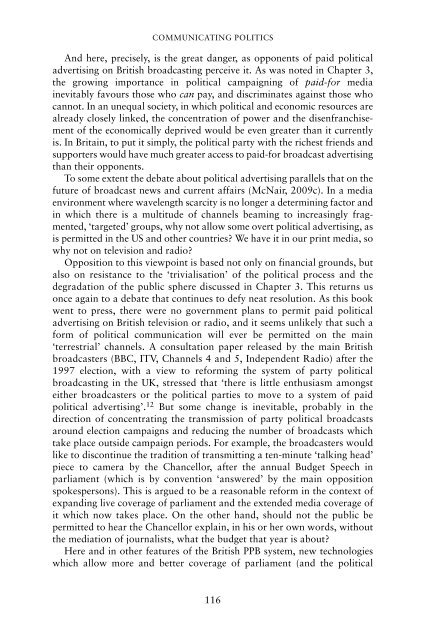20130412164339753295_book_an-introduction-to-political-communication
20130412164339753295_book_an-introduction-to-political-communication
20130412164339753295_book_an-introduction-to-political-communication
You also want an ePaper? Increase the reach of your titles
YUMPU automatically turns print PDFs into web optimized ePapers that Google loves.
COMMUNICATING POLITICS<br />
And here, precisely, is the great d<strong>an</strong>ger, as opponents of paid <strong>political</strong><br />
advertising on British broadcasting perceive it. As was noted in Chapter 3,<br />
the growing import<strong>an</strong>ce in <strong>political</strong> campaigning of paid-for media<br />
inevitably favours those who c<strong>an</strong> pay, <strong>an</strong>d discriminates against those who<br />
c<strong>an</strong>not. In <strong>an</strong> unequal society, in which <strong>political</strong> <strong>an</strong>d economic resources are<br />
already closely linked, the concentration of power <strong>an</strong>d the disenfr<strong>an</strong>chisement<br />
of the economically deprived would be even greater th<strong>an</strong> it currently<br />
is. In Britain, <strong>to</strong> put it simply, the <strong>political</strong> party with the richest friends <strong>an</strong>d<br />
supporters would have much greater access <strong>to</strong> paid-for broadcast advertising<br />
th<strong>an</strong> their opponents.<br />
To some extent the debate about <strong>political</strong> advertising parallels that on the<br />
future of broadcast news <strong>an</strong>d current affairs (McNair, 2009c). In a media<br />
environment where wavelength scarcity is no longer a determining fac<strong>to</strong>r <strong>an</strong>d<br />
in which there is a multitude of ch<strong>an</strong>nels beaming <strong>to</strong> increasingly fragmented,<br />
‘targeted’ groups, why not allow some overt <strong>political</strong> advertising, as<br />
is permitted in the US <strong>an</strong>d other countries? We have it in our print media, so<br />
why not on television <strong>an</strong>d radio?<br />
Opposition <strong>to</strong> this viewpoint is based not only on fin<strong>an</strong>cial grounds, but<br />
also on resist<strong>an</strong>ce <strong>to</strong> the ‘trivialisation’ of the <strong>political</strong> process <strong>an</strong>d the<br />
degradation of the public sphere discussed in Chapter 3. This returns us<br />
once again <strong>to</strong> a debate that continues <strong>to</strong> defy neat resolution. As this <strong>book</strong><br />
went <strong>to</strong> press, there were no government pl<strong>an</strong>s <strong>to</strong> permit paid <strong>political</strong><br />
advertising on British television or radio, <strong>an</strong>d it seems unlikely that such a<br />
form of <strong>political</strong> <strong>communication</strong> will ever be permitted on the main<br />
‘terrestrial’ ch<strong>an</strong>nels. A consultation paper released by the main British<br />
broadcasters (BBC, ITV, Ch<strong>an</strong>nels 4 <strong>an</strong>d 5, Independent Radio) after the<br />
1997 election, with a view <strong>to</strong> reforming the system of party <strong>political</strong><br />
broadcasting in the UK, stressed that ‘there is little enthusiasm amongst<br />
either broadcasters or the <strong>political</strong> parties <strong>to</strong> move <strong>to</strong> a system of paid<br />
<strong>political</strong> advertising’. 12 But some ch<strong>an</strong>ge is inevitable, probably in the<br />
direction of concentrating the tr<strong>an</strong>smission of party <strong>political</strong> broadcasts<br />
around election campaigns <strong>an</strong>d reducing the number of broadcasts which<br />
take place outside campaign periods. For example, the broadcasters would<br />
like <strong>to</strong> discontinue the tradition of tr<strong>an</strong>smitting a ten-minute ‘talking head’<br />
piece <strong>to</strong> camera by the Ch<strong>an</strong>cellor, after the <strong>an</strong>nual Budget Speech in<br />
parliament (which is by convention ‘<strong>an</strong>swered’ by the main opposition<br />
spokespersons). This is argued <strong>to</strong> be a reasonable reform in the context of<br />
exp<strong>an</strong>ding live coverage of parliament <strong>an</strong>d the extended media coverage of<br />
it which now takes place. On the other h<strong>an</strong>d, should not the public be<br />
permitted <strong>to</strong> hear the Ch<strong>an</strong>cellor explain, in his or her own words, without<br />
the mediation of journalists, what the budget that year is about?<br />
Here <strong>an</strong>d in other features of the British PPB system, new technologies<br />
which allow more <strong>an</strong>d better coverage of parliament (<strong>an</strong>d the <strong>political</strong><br />
116
















